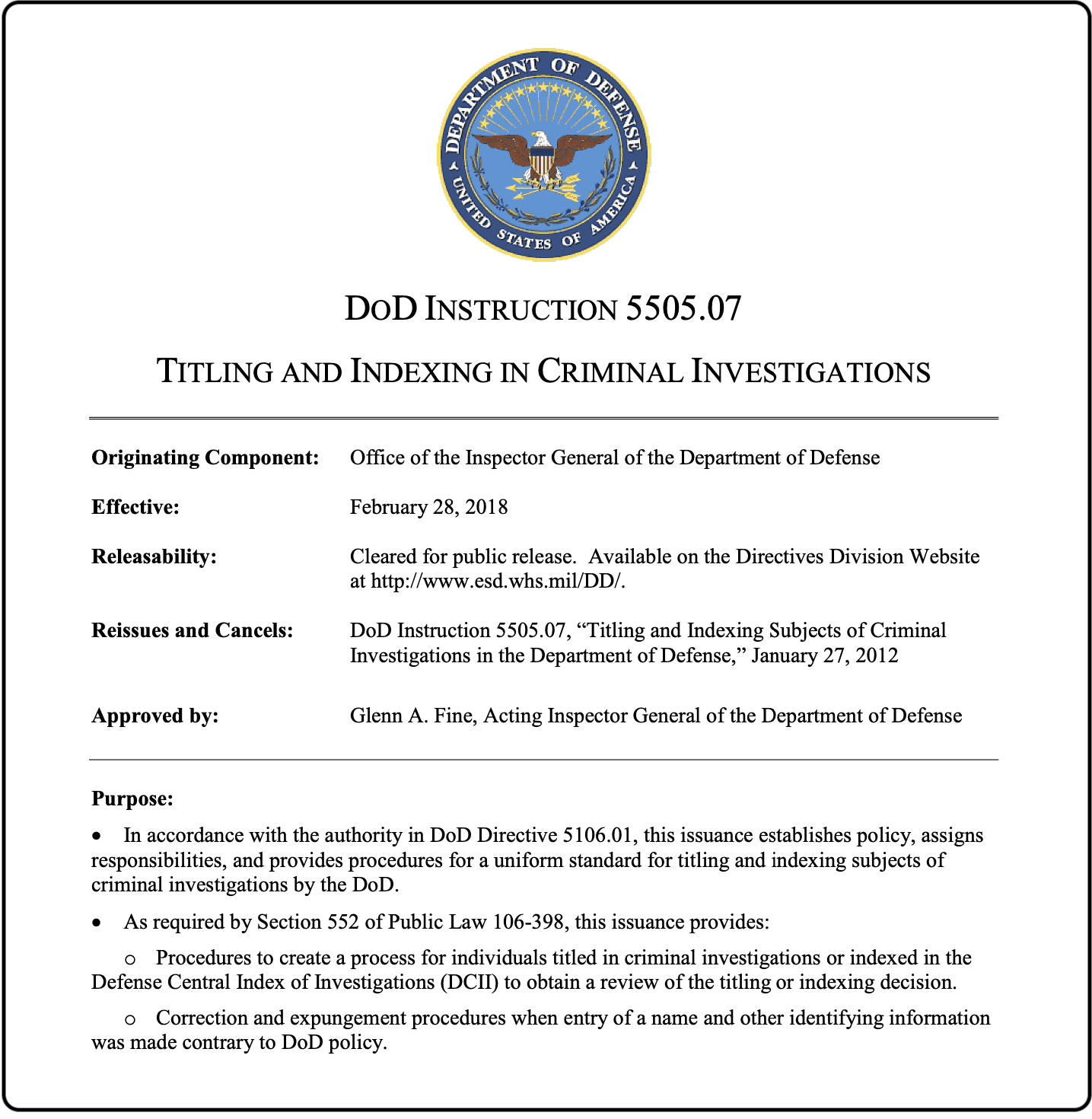
Titling Removal Actions
An improper titling decision can have devastating and long-lasting consequences for a service member. MJA often receives phone calls from veterans who were titled on active duty for offenses which did not result in punishment and who later received an honorable discharge. Fortunately, the service branches provide a process to request expungement of an improper titling and indexing determination. MJA has successfully helped service members get their records and DNA expunged. Contact us today to learn more!
MJA has successfully helped veterans who were improperly titled get their records corrected. Contact our military defense lawyers now at (843) 773-5501 to learn more.
Overview
Being titled in the military is as simple as being named as the “subject” of a CID or NCIS report of investigation. In order to title someone, the investigator on the case only needs to develop credible information that the service member committed a criminal offense. Credible information can be as little as an alleged victim’s first statement to military police. Titling is not a legal decision; it is strictly investigative. So when a person is titled, that doesn’t mean he or she actually committed any crime. Simply put, to be titled is to be the subject of an investigation.
Legal Authority
DoD Instruction 5505.07, Titling and Indexing in Criminal Investigations , establishes the DoD’s policies and procedures for titling and indexing subjects of criminal investigations. This policy requires the titling and indexing of any service member under criminal investigation “as soon as the investigation determines there is credible information that the subject committed a criminal offense.”
This is an incredibly low standard. Once the subject of a criminal investigation has been indexed in the federal law enforcement database (DCII), “the information will remain in the DCII, even if the subject if found not guilty of the offense under investigation.” The only exceptions to this policy are where “there is a mistaken identity or it is later determined no credible information existed at the time of titling and indexing.”

National Defense Authorization Act
On 1 January 2021, the National Defense Authorization Act directed the Secretary of Defense to create a new policy and process to allow service members to appeal titling and indexing determinations.
Specifically, the law directed the SecDef to create a process through which any person who was titled and indexed may request that their name, personally identifying information, and other information pertaining to them be corrected in, or expunged or otherwise removed from:
- a law enforcement or criminal investigative report of the DOD or any component of the DoD;
- an index item or entry in the DCII; and
- any other record maintained in connection with a report or index entry in any records database maintained on behalf of the DOD.
Under the new law, a correction or expungement to a record is required when:
- probable cause did not or does not exist to believe that the offense for which the person’s name was placed, or insufficient evidence existed or exists to determine whether or not such offense occurred;
- probable cause did not or does not exist to believe that the person actually committed the offense for which they were titled, or insufficient evidence existed or exists to determine whether or not the person actually committed such offense; or
- such other circumstances, or on such other bases, as the Secretary may specify in establishing the policy and process.
In making this determination, reviewing authorities should consider the following circumstances relevant to the case at issue:
- the extent or lack of corroborating evidence against the titled person concerned with respect to the offense at issue;
- whether adverse administrative, disciplinary, judicial, or other such action was initiated against the titled person for the offense at issue; and
- the type, nature, and outcome of any action described in subparagraph (b) against the titled person.
The NDAA provides a more favorable standard to service members seeking to amend or expunge a titling determination.
Effect of Being Titled
While the burden to title someone is quite low, the burden it places on the person titled can be heavy. When a service member is titled, the report of investigation is indexed in the Defense Clearance and Investigations Index. Once a person is titled and indexed, the record will be on file and accessible for up to 40 years.
When a person is titled, the record can be (and often is) accessed during background checks for such things as employment and education applications. This record can be likened to an arrest without further prosecution in the civilian world. It will often require explanation and can be a determining factor for employers, educational institutions, and other areas where background checks are required.
Appealing a Titling Decision
When a person has been indexed after titling, there are ways to attack the record and amend or delete the titling decision. For example, titling information indexed in the DCII can be expunged or corrected if the titling resulted from mistaken identity or if no credible information existed at the time the titling decision was made.
As one may imagine, a request to amend or delete a titling decision is a tall task. Doing so often requires combing through investigative files, statements, interviews, and other records created throughout the investigation and strategically building a case based on all the information available.
Titling Appeals Can Be Successful
MJA has successfully fought for service members who were improperly and unjustly titled and indexed. Past examples include:
A Captain (0-3) in the United States Army was titled and indexed for Resisting Apprehension in violation of Article 87a, UCMJ. The Soldier appealed the decision and provided evidence to DACID that he had not resisted apprehension. After reviewing the evidence and argument presented by MJA, DACID agreed that there was no probable cause to believe that the officer had resisted apprehension and directed that his record be amended to remove his name from the title block for the offense and that any corresponding entry into the Defense Central Index of Investigations (DCII) should be removed.
A Private First Class (E-3) in the United States Army was titled and indexed by the Army Criminal Investigation Division (CID) for assault consummated by battery after a domestic incident with her spouse. The Soldier was never taken to court-martial or nonjudicial punishment and was later honorably discharged. Despite these facts, the Soldier remained titled and later learned that she was disqualified from working in the healthcare field due to the titling action. After USACID refused to remove the titling entry, MJA appealed the decision to the ABCMR. The Army Board determined that the Soldier was the victim of domestic physical abuse and should not have been titled. The ABCMR granted the Soldier full relief and recommended that all Department of the Army records concerning the Soldier be corrected by removing her name from the title block of the law enforcement report.
A Chief Petty Officer in the United States Navy was titled and indexed by the Naval Criminal Investigative Service (NCIS) during an investigation for a violation of Article 120, UCMJ. Despite substantial and overwhelming evidence showing that the Sailor did not commit the offense, NCIS refused to remove the titling determination. MJA appealed the decision to the BCNR, which determined that credible information did not exist to title the Sailor and that the titling was a “significant injustice.” The BCNR granted the Sailor full relief and recommended that NCIS expunge his name as a titled and indexed subject from the NCIC and DCII criminal history databases.
A Captain (O-3) in the United States Army was falsely alleged of assault-consummated by battery while on active duty and “titled” as part of a CID investigation. After his discharge from the Army, this titling decision showed up as an arrest on a background check. MJA submitted multiple written matters showing that the Captain did not commit the alleged offense. Upon review, the U.S. Army Criminal Investigation Command agreed that the allegation of simple assault-consummated by battery was “unfounded” and deleted the Captain’s NCIC entry from the FBI’s database.
Contact MJA Today
An experienced military lawyer has the skills and expertise to effectively build and present a case to amend or delete a titling decision.
If you have been titled, please contact Military Justice Attorneys at (843) 773-5501 to speak with a lawyer about your options.

What Our Clients Say
-
"He is an articulate pitbull in the courtroom."
My career, my life, my future was completely in his hands and he took it as seriously as I did. He is an articulate pitbull in the courtroom. I highly recommend his services if you expect to have any chance of seeing the justice you truly deserve.
- Corporal, USMC -
"It Was Like a Scene From a Movie"
The results I received from the board was the best possible outcome in my favor and saved my career and my family’s future.
- Master Sergeant, USAF -
"I trusted him with my career on the line, and he was outstanding."
Mr. Hill tore apart the government's theory piece by piece . . . I trusted him with my career on the line, and he was outstanding.
- Petty Officer Third Class, USN -
"I would not want my fate in anyone else’s hands."
Gerry Healy is an outstanding attorney. In the courtroom he is confident, knowledgeable, and aggressive. I would not want my fate in anyone else’s hands.
- Airman First Class, USAF -
"Mr. Hodge was relentless in his defense of me"
Mr. Hodge was relentless in his defense. . . and absolved me of any wrongdoing under the UCMJ.
- Corporal, USMC

Our Battles Won
Results Matter. When your career, reputation, and freedom are on the line, you need an experienced law firm in your corner. With more than 75 years of combined legal experience, the attorneys at MJA know how to fight and win. Our results speak for themselves.
-
"NOT GUILTY"
Fort Cavazos, Texas. Army Staff Sergeant Acquitted of Murder at General Court-Martial After Deadly Shooting Incident in Texas.
-
"NOT GUILTY" "NOT GUILTY"
Quantico, Virginia. Marine Corporal (E-4) Acquitted at Court-Martial of Wrongful Drug Use After Positive Urinalysis.
-
"NO BASIS"
Joint Base Pearl Harbor-Hickman, Hawaii. Administrative Discharge Board Finds “No Basis” for Alleged Senior Leader Misconduct.
-
"NOT GUILTY" Fort Cavazos, Texas
Fort Hood, Texas. Army Private Second Class (E-2) Acquitted of Rape and Sexual Assault Charges After Week-Long Trial.
-
"NOT GUILTY" Parris Island, South Carolina
Parris Island, South Carolina. Marine Staff Sergeant (E-6) Acquitted at Court-Martial of Hazing, Blood Striping, and Pinning.
-
"NOT GUILTY" "NOT GUILTY"
Kings Bay, Georgia. Navy Master-at-Arms Found Not Guilty of Unholstering Firearm and Pointing it at Another Sailor.
-
"NOT GUILTY" "NOT GUILTY"
Spangdahlem Air Base, Germany. Senior Airman (E-4) Accused of Rape and Abusive Sexual Contact Acquitted by Military Judge.